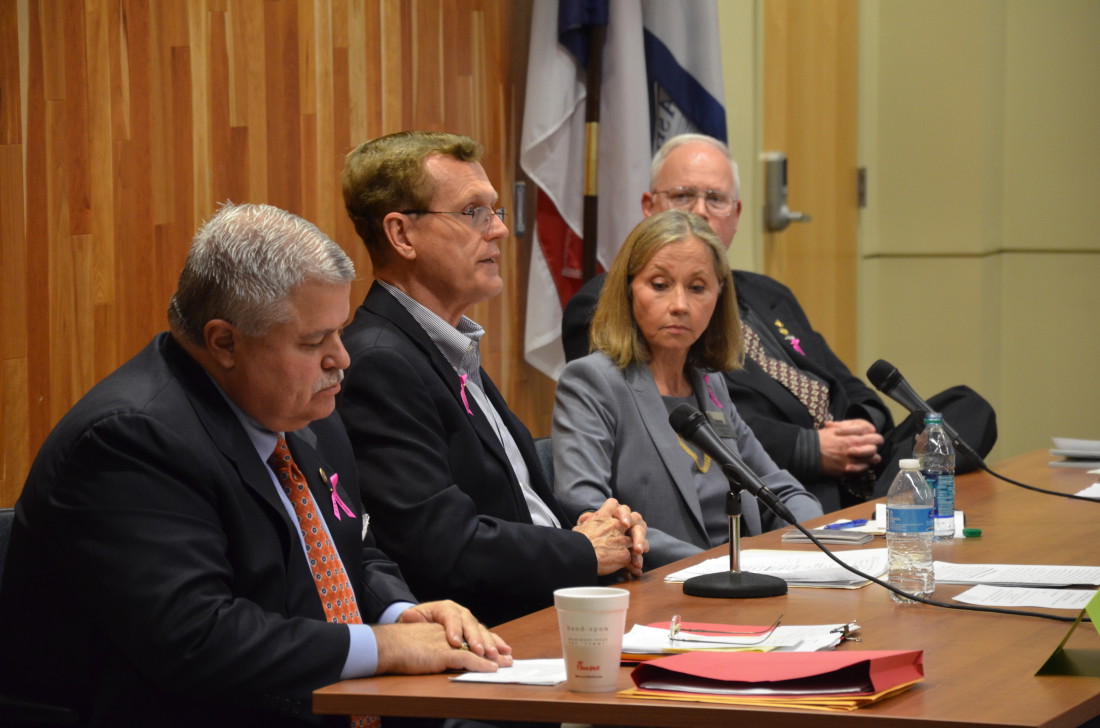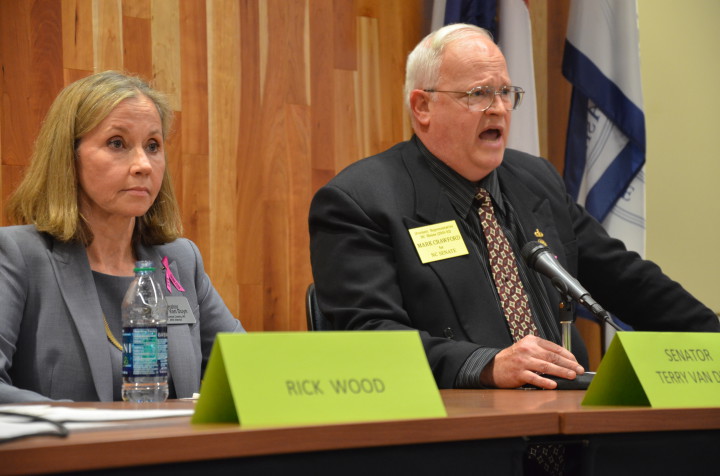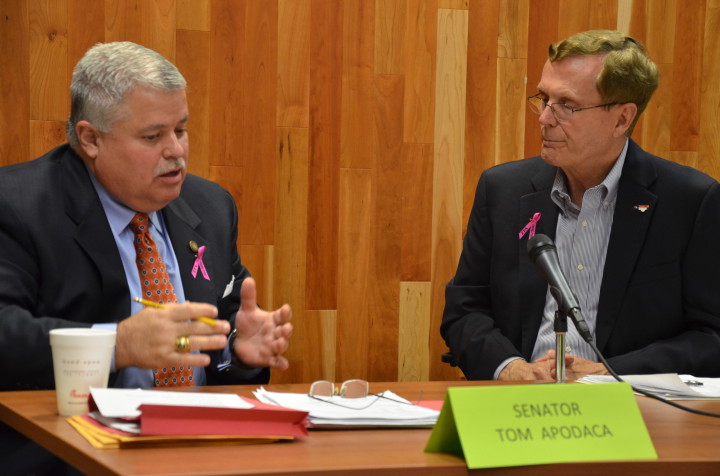Candidates hoping to represent Western North Carolina in the state Senate debated Oct. 16 at UNC Asheville, highlighting differences on a range of issues, from education and the economy to the environment. Here’s a look at the candidates and their views.
District 49
In the District 49 race, Democratic Sen. Terry Van Duyn and Republican Mark Crawford are vying to represent heavily Democratic territory that includes Asheville and all but a small sliver of southern Buncombe County.
A longtime community activist, Van Duyn was picked by Buncombe County Democratic Party leaders in April to complete the unexpired term of Sen. Martin Nesbitt, the state Senate minority leader who died in March.
A retired systems analyst and business woman, Van Duyn lives in Biltmore Forest. She has served as a volunteer on the boards of a long list of local organizations, including Carolina Day School, Meals on Wheels, the Autism Society of North Carolina and the Children’s Welfare League.
From a family of eight children whose parents didn’t graduate from college, Van Duyn said she credits public schooling with her success and sees her role as a senator as a way to give back to the community. “I want to make things better for working families in North Carolina,” she said.
Crawford also touted a lifetime of community service, including time in the army. A Gulf War veteran, he lives in Black Mountain and was appointed to the N. C. House for a short stint in 2001. Born and raised in Buncombe County, Crawford has taught history at Western Carolina University since 2005 and said, “Education should be the No. 1 priority.”
But on how to improve the education system, Crawford and Van Duyn diverged.
“We’re failing our education system, despite this constant urge to pour more and more money into it,” said Crawford. Instead of increasing the total amount of funding, he said he’d rather prioritize where existing funding goes. For example, Crawford called administrative costs “excessive” and said he’d support a law banning school administrators from receiving more than twice the starting salary of a new teacher.
Crawford also said he’d like teachers to have more freedom in the classroom. “Testing is ruining the ability of our teachers to be able to effectively teach,” he said. “Teaching for the test is handicapping our students.”
On school funding, Van Duyn countered, “This is not a question of cutting funding for administration. This is a question of not spending enough money on education.”
The teacher pay raises passed earlier this year were “insufficient and unsustainable,” and “one of the many reasons I voted against budget,” she said.
Van Duyn said that increasing revenue needs “to be on the table.” To do that, she said she’d “look at everything,” including rolling back “the tax cuts to the wealthy and the corporations” that were passed in recent years by Republican leaders, she said. “We are starving North Carolina. We need to make investments in our future.”
The candidates also differed on their approaches to economic development.
Asked their opinions on using incentive deals to lure private companies to expand, Crawford said he opposes them flatly. “North Carolina should not be in the business of handpicking winners and losers,” he said. “Unless these incentives are offered equally to every business, I’m opposed to them.”
Van Duyn said she has “a theoretical problem” with incentives, but offering them is necessary to compete with other states for business. She used the example of the recent expansion of GE Aviation in Buncombe County — and the hundreds of local jobs it will create — as worth the millions in state incentives that went to the company in support.
Van Duyn also said she has concerns about moves by Gov. Pat McCrory in recent months to shift business recruitment efforts from local areas to Raleigh. Noting that her business background is in the technology sector, Van Duyn said another economic priority is finding “ways to get rural folks more broadband Internet.”
Crawford, on the other hand, said that his economic focus would be on cutting “red tape and bureaucracy.”
On the environmental front, Crawford criticized Van Duyn for voting against a law that puts coal ash ponds at the Duke Energy power plant in Skyland on a high priority list for cleanup. “To vote against the coal ash cleanup … that’s a travesty,” he said.
Van Duyn replied that she’s grateful the new law “took care of our coal ash ponds.” Her problem with the legislation was that it didn’t go far enough to ensure the timely cleanup of dozens of other hazardous ponds across the state, she said.
The two found common ground, however, on hydraulic fracturing, often called “fracking” — a controversial method of mining for natural gas that environmentalists say can be hazardous. Van Duyn voted against allowing the practice in North Carolina without more study. Crawford also said he was “leery” about such mining and thinks the state should’ve gathered more information before allowing it.
District 48
As Chairman of the Committee on Rules and Operations, Sen. Tom Apodaca has become one of the most powerful figures in the General Assembly. First elected in 2002, the Hendersonville Republican represents District 48, which includes Henderson and Transylvania counties as well as a section of southern Buncombe County.
Since Republicans took control of the Senate chambers in 2010 after decades of Democratic rule, Apodaca said he thinks “we’re making progress in North Carolina.”
Democrat Rick Wood, also a resident of Hendersonville, is challenging Apodaca this year. Wood is a retired public school teacher and coach who has served on the Henderson County Board of Education since 2008. He said that improving the state education system would be his No. 1 priority if elected.
“I want to restore our public schools [and] make them better,” he said. Apodaca, he said, has supported cuts to education that have caused “horrific” shortages in teacher assistants and supplies. “I’m strongly opposed to the education cuts we’ve seen,” said Wood. Although total state spending has increased in recent years, it hasn’t kept up with rising enrollment and school needs, he continued. “Per pupil funding is what counts.”
Apodaca responded that his wife is a former public school teacher and that he has served on the Western Carolina University board of trustees. He defended his votes on state education spending, blaming the economic recession and local governments for shortages. Tough economic times since 2008 have forced the legislature “to make hard choices,” Apodaca said. “We’re going to do the best we can going forward. … We’re getting there.”
Saying that North Carolina ranks relatively high in the country for total state education spending, Apodaca said county and city governments should do more to contribute. “I’m tired of being blamed,” he asserted. “It comes down to the local areas and how much they put into education.”
Apodaca also said he favors cutting administrative costs by consolidating some of the state’s school systems, although he didn’t specify which ones. (Consolidating the Asheville City and Buncombe County school systems has long been a topic of conversation among local and state officials.)
Wood said he’d look for ways to increase education funding by reversing corporate tax breaks and “reshifting some priorities.”
The candidates also butted heads on fracking. Apodaca voted in support of the practice but said it’s unlikely such mining will ever occur in WNC, due to its geology. Fracking in WNC “is a myth brought forward by radical environmentalists,” he declared.
“I’m not a radical environmentalist,” Wood retorted, “but I would’ve voted against fast-tracking fracking.” He opposes the practice across the entire state, he said, adding that Apodaca supported a bill that allows companies to keep secret what chemicals they use for the mining. Such chemicals could pollute drinking water, said Wood, calling the fracking bill “crazy legislation.”






A fix for the US School System?
The present US education system does very little to prepare the students for the real world. At the end of 12th grade very few have any true skills to get a job. Plus many college degrees are useless as they are too general and the first two-years are usually a repeat of high school. Many students cannot get jobs that justify the cost of college.
I think the following would go along way to fix the system. First thru sixth grade the teachers must teach the students the BASICS like math, speaking, spelling, reading and writing. Teach math without calculators. Teach the student what type questions to ask themselves to reason out the answers for themselves. Teach US history with solid knowledge of the Constitution and Bill of Rights, plus world history and geography are a must.
Starting in 7th grade the courses change to three hours a day for courses to prepare the student for college. One hour a day for a course called LIFE. This course would teach the student EVERYTHING they need to know once they begin life after 12th grade. Like cooking, washing the clothes, balance the checkbook, understanding the interest rates on loans, how to do a budget and stick to it, etc. Then four hours of vocation/trade skills. These courses would teach skills to be a plumber, carpenter, chef, landscaper, auto mechanic, dental tech, nursing, etc. The courses would also include management, purchasing, accounting and all of the skills needed to run a business. At the end of the courses the instructors would or would not issue a certificate that guarantees the employer that the student can do the job without supervision and correctly. The student could in many cases finish school with three to six skills. I am pretty sure the drop out rate would be much lower then it is now. And the students would be more prepared to start life on their own.
Newly Discovered Eighth Grade Exam From 1912 Shows How Dumbed Down America Has Become http://endoftheamericandream.com/archives/newly-discovered-eighth-grade-exam-from-1912-shows-how-dumbed-down-america-has-become
Just, maybe we should go back about hundred years or so and use the curriculum from then and maybe the methods teachers use then too.
Throwing Money At Education Isn’t Working http://www.statebudgetsolutions.org/publications/detail/throwing-money-at-education-isnt-working
It has already been announced (before the fracking hearing in Cullowhee) that there is NO SHALE in WNC, so NO GAS, which means NO DRILLING.
I went to the Fracking Hearing in Cullowhee and all I heard were people that did not know that there is NO SHALE in WNC, so no gas to drill. And they did not know that the gas in the center part of the state in three counties does not contain enough gas to make fracking worth while. Do you know why you do not live in the 1700’s? ENERGY!!!! The 1700’s was a world that could not sustain the world’s population of today. Because it was a world that could not grow and transport the food the people needed. Do you wish millions and millions of people to die? Do you even know now dirty and hard your life would be without coal, gas and oil? The marvels that were not available in the 1700’s are possible today because of coal, gas and oil. Yes, its about our future and I for one wish to continue to live in this period, because of the marvels coal, gas and oil enables us to have safely. Just look around your house just about everything it is because of coal, gas and oil made it possible to be made and distributed to those that need or wanted them. Many people do not understand even how much coal, gas and oil goes into making items like wind mills and solar panels. They do not know how many birds for example windmills and solar farms kill each year. Did you know that much that was stated in the video GASLAND was been debunked? Did you know that fracking has been going on since 1947? If, you and others wish to learn more about fracking visit http://tarheelteaparty.org/?page_id=11603 as there are many articles and videos on it that explains fracking. If, you find it too hard to visit the page above, do try watching at least the video at this link – http://youtu.be/qXCUk0WTNuQ its from Canada.